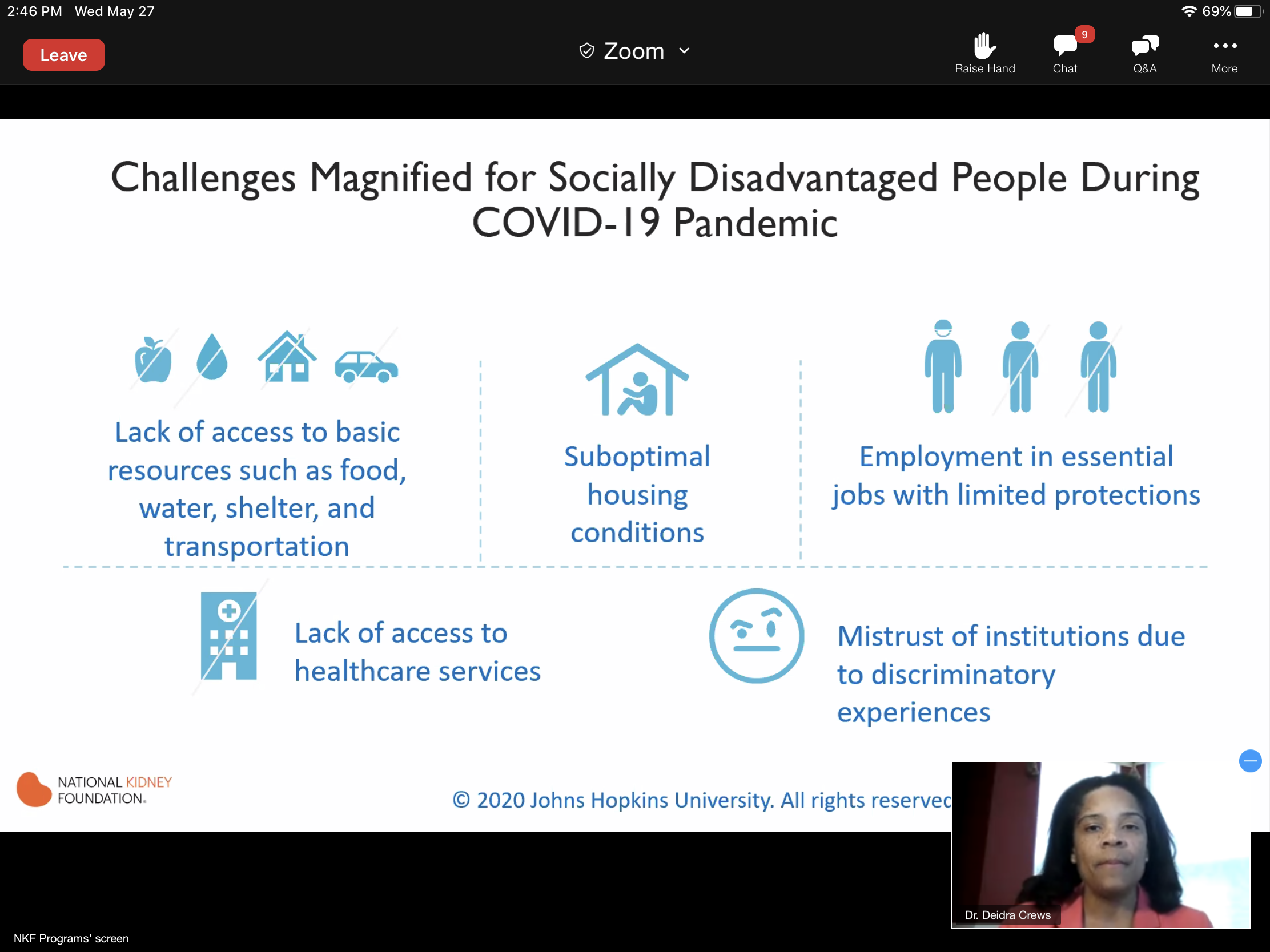Five Plus Nuts and Beans Study Continues Despite COVID-19 Disruptions
Many Black and minority Americans have unhealthy diets that contribute to the development of chronic diseases such as obesity, high blood pressure, kidney disease, and cardiovascular disease. The Johns Hopkins University Center for Health Equity’s Five Plus Nuts and Beans for Kidneys study focuses on the effects of diet on kidney health and blood pressure among low-income African Americans with hypertension and early chronic kidney disease in Maryland.
BACKGROUND
Participants in the Five Plus study receive dietary advice from a nutritional coach plus $30 worth of healthful foods—including nuts and beans!—each week for four months to see whether this creates sustainable changes in participants’ diets and positively impacts their kidney function and blood pressure. The results of the study, which ends in 2021, will shape both patient education and health policy decisions in clinical and community settings.
PROGRESS MADE TO DATE
Progress on the study continues to be excellent. 27 new patients had been enrolled in the five months between October 2019 and March 2020, leaving us only 37 of the total planned 150 study patients left to recruit. During this same period, 23 patients completed their term in the study. The study was also reviewed and approved for continuation by the Data and Safety Monitoring Board in February.
In mid-March, as with just about everything else in the world, the operations of the study were profoundly changed by the onset of the COVID-19 pandemic. By late March, following the guidance of Johns Hopkins Medicine leadership, we stopped all in-person visits, which included recruitment and enrollment of new participants, follow-up research visits for enrolled participants, and delivery of the healthy food. Study team members immediately began exploring and implementing new procedures that would permit the study to continue while keeping our patients safe.
The team was able to maintain the dietary coaching intervention via phone calls with the participants who had moved beyond receiving the $480 worth of groceries. Participants who had recently enrolled in the study at the time of disruption (who were still receiving either the $30 worth of groceries per week or $30 gift card per week) were provided with ShopRite gift cards loaded with the amount of grocery money they were budgeted to receive during the study. We compiled and sent a list of food resources for free food and food delivery options for all of the study participants, and we continue to update this list of resources for participants. We also ordered washable cloth face masks to send to participants as a way to let them know we are thinking of them and hope they stay safe.
In April, we updated our Five Plus study Community Advisory Board members and sent them a letter summarizing our actions in response to the COVID-19 shut-down of in-person research procedures. We also held a virtual (Zoom) meeting with the Board members in May to provide further updates on the study, and to seek their input on approaches for study recruitment once in-person research resumes at Hopkins.
Our study team member (Tahiyat Sheikh) receives her first study lab coat with the beautiful 5 Plus study logo. (left) 5 Plus study staff (Erika and Debra Gayles) shopping and sorting groceries at ShopRite for dietary intervention participants. (bottom right)
In addition to the progress on the main study, we completed participant recruitment for an ancillary “PhotoVoice Project,” led by Dr. Anika Hines, one of the co-investigators of the Five Plus study. PhotoVoice is a community-based participatory research tool that uses photography to engage participants in reflection and dialogue regarding their community’s strengths, needs, and capacity for change. For this project, 25 participants were recruited into the study who could use cameras to capture their food environment, and share the photos at weekly discussion sessions. The data and photos obtained will be used to engage multiple community stakeholders in conversations regarding Baltimore’s food environment and how to how to apply dietary strategies as sustainable population health solutions. The PhotoVoice sessions are currently being transcribed and coded for analysis, and a PhotoBook with recipes and quotes from participants is being developed for presentation to stakeholders who can help address the food environment for citizens of Baltimore. A mock-up of this PhotoBook/Cookbook is being prepared for the CHE Community Advisory Board meeting in June 2020 for their input and feedback toward dissemination efforts.
Thus far, the Five Plus study appears to be successful in modifying the diet—and health--of the participants. One patient reported that being a participant in the study has changed her and her family’s diet completely, with everyone in the house now following the Five Plus guidelines. Another patient was able to transition off insulin by following the Five Plus dietary guidelines and including other healthy lifestyle changes.
The study is still in process, but the preliminary results are promising. Improving diet may be an important tool in improving the health of disadvantaged populations, and we will continue to report on the positive effects that this study has on patients’ health.
RELEVANT LEARNING RESOURCES



